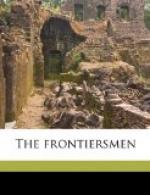Some adequate idea of the desolation and destitution of the Indians may be gleaned from the reports to the British government: “The Cherokees must certainly starve or come into terms, and even in that case Colonel Grant thinks it is hardly in the power of the provincials to save them. He proposed in a few days to send for The Great Warrior (Oconostota) and The Little Carpenter (Atta-Kulla-Kulla) to come and treat for peace, if they choose to save their nation from destruction. Till he receives their answer he will endeavor to save the small remains of the Lower Towns. In the mean time Colonel Grant intends to put Fort Prince George into repair, and to wait there or at Ninety-Six till he receives orders from Sir Jeffrey Amherst.”
The idea of the pangs of hunger and the sight of starvation and deprivation may have been the more repugnant to Colonel Grant since he was himself famous as a bon vivant and gourmet. Indeed, even yet, in turning old pages we come upon records of his dinners. Bartram, the Philadelphia botanist, whom the Muscogee Indians quaintly called Puc-Puggy (the Flower Hunter) details the great size of a rattlesnake, “six feet long and as thick as the leg of an ordinary man” which he chanced to kill in his bosky researches near Fort Picolata in Florida, and not the least surprising feature of the incident was a message from the commandant inviting both combatants to dinner, “Governor Grant being very fond of rattlesnake flesh.” This officer, at that time Royal Governor of East Florida, was holding a congress with the Creek Indians hard by the fort, having come from St. Augustine with a detachment of its garrison for the purpose. Bartram, dining in company with Grant that day, saw his enemy served up in several different styles,—and he, too, must turn softhearted!—he could not partake of the dish,—and “was sorry after killing the serpent, when coolly recollecting every circumstance of it.” However, neither the rattlesnake nor the Cherokees were in condition to profit by these belated graces of magnanimity.
Through Grant’s scattered correspondence there is a flavor of “vivers.” Frederick George Mulcaster, still with the garrison of St. Augustine, in a letter addressed to Grant, then in Boston, laughingly alludes to his constant good cheer. “Captain Urquhart writes to his brother officers here that ‘General Grant lives like a General!’” And later, in piteous contrast, “His Excellency (the new Royal Governor) gave a dinner yesterday to the officers of the Fourteenth and some others. It is the only dinner he has given since the one he gave to John Stuart (famous as the survivor of Fort Loudon) upon his arrival here,”—a matter of two months. He further notes as a point of interest, “Your black man, Alexander, was with me this instant to inquire after your health, and has loaded me with beaucoup de complimens. He wishes much to come to make your bread.” Doubtless it was well made, for Grant, prospering, went on from dinner to dinner, from promotion to promotion, attaining the rank of General in the army and great corpulency, representing Sutherlandshire in the British Parliament many years, and dying at the age of eighty-six at his birthplace, Ballindalloch, in the north of Scotland.




